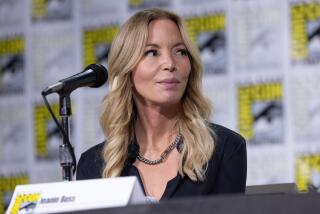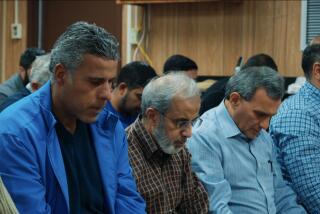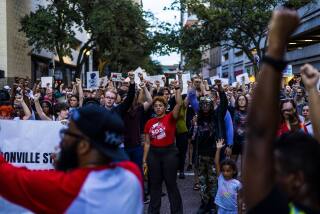Muhammad Case Suspect Has a Record of Violence : Shooting: James E. Bess was acquitted in the slaying of his brother. He was convicted of manslaughter in Missouri.
- Share via
When James E. Bess was arrested in the attempted slaying of a Nation of Islam leader in Riverside, those who had known him in recent years found the outburst of violence out of character.
But his past as a young Muslim was marked by serious clashes that resulted in arrests, convictions and the death of his brother.
In the mid-1960s, Bess was convicted of manslaughter in Missouri and of assault in Fresno, according to newspaper accounts at the time. A decade later, he fatally shot his brother during a family argument at his Fresno home, but a jury found that he had acted in self defense.
“Violence has a way of following him around,” said John Nelum, head of the National Assn. for the Advancement of Colored People in Fresno, who has known Bess for more than 20 years.
Bess, 49, a former Nation of Islam minister who was expelled a few years ago, now stands accused of trying to kill Khallid Abdul Muhammad, whom Nation of Islam leader Louis Farrakhan suspended last year after his verbal assault on Jews, Arabs and whites prompted national leaders to denounce him.
Investigators said Tuesday that they are trying to determine whether Bess was stalking Muhammad before the Muslim leader and five bodyguards were wounded Sunday night at a UC Riverside auditorium.
Sources said Bess was seen outside a Los Angeles theater the previous night while Muhammad was speaking inside.
Several Nation of Islam members knew the shooting suspect and recognized him as he sat in his parked car at the Vision Theater in Leimert Park, then walked back and forth outside, said various sources, who spoke on condition of anonymity.
One source, a high-ranking official of the Nation of Islam, said Bess never entered the theater, but became conspicuous for hanging around outside while Muhammad spoke inside.
Police investigators said they were trying on their own to reconstruct Bess’ movements in the hours and days before Muhammad was shot in Riverside.
Inside Bess’ vehicle, which was parked near the auditorium, police found a scope-equipped, high-powered rifle and ammunition. Outside the building, police found a backpack containing two additional semiautomatic handguns similar to the one they say was used in the shooting.
Muhammad, diverting from security plans, stepped outdoors after his two-hour campus presentation to continue to answer questions.
Bess allegedly got to within 10 feet of him and opened fire, striking Muhammad and five of his bodyguards. Muhammad, who underwent surgery Tuesday for removal of a bullet in his foot, remains hospitalized, along with another man.
Police said Tuesday they had no clues to Bess’ motives.
“We’re not dealing with a whodunit,” said UC Riverside Police Chief Hank Rosenfeld. “We know whodunit. What we’re dealing with is why.”
Without notice, Bess was quietly arraigned Tuesday afternoon before Riverside Municipal Court Judge Gary Tranbarger. He was charged with one count of attempted premeditated murder, with the use of a gun and inflicting great bodily injury. Bess also was charged with five counts of assault with a firearm with infliction of great bodily injury. The most serious charge carries a possible life prison term.
Answering the judge’s inquiries in a soft voice, Bess pleaded not guilty to the six counts and was assigned a public defender, according to the Riverside County district attorney’s office. His preliminary hearing was scheduled for June 14.
Bess was being held without bail and under police guard. He remains in Riverside General Hospital for treatment of a broken shoulder, broken teeth and other injuries he suffered in a beating during the melee after the shooting.
Muhammad remained in a secured room at Riverside Community Hospital, protected by members of the Nation of Islam’s contingent of security guards known as the Fruit of Islam.
A number of ranking Nation of Islam officials visited him during the day, including Wazir Muhammad, West Coast bureau chief of the Final Call, the religion’s newspaper. He said that Farrakhan was expected to issue a statement soon.
Bess joined the Nation of Islam in the mid-1960s, one of the first and most committed members in the Fresno area.
Nelum, the NAACP chief, recalled that Bess was bright and personable but had a violent streak.
“I wouldn’t say James has a history of being crazy,” he said. “But he’s definitely a strange fellow. You don’t push James. He’s bound to explode.”
In March, 1966, the Fresno Bee reported that Bess, then 21, and his 19-year-old brother were sentenced to prison terms in the beating and kicking of a 41-year-old Fresno man who refused to buy the newspaper Muhammad Speaks.
Bess admitted that he kicked the man when he was down and had “lost control of himself,” the Bee reported.
During the trial, the prosecutor revealed that the Bess brothers also were convicted in 1964 of manslaughter and sentenced to 10 years in prison but paroled the same day, in Caruthersville, Mo.
After the assault conviction, state medical authorities said James Bess represented “a considerable potential menace to the community.”
In 1975, the Bee reported, Bess, then 30, shot his older brother, Elvin, in the right eye, killing him. When police arrived, Bess handed over a .22-caliber rifle and said, “You can have the rifle. I shot him.”
Bess told police he believed his brother had a gun in the package he carried, according to a newspaper account at the time, but the package contained a frying pan found near the victim’s body. The jury acquitted Bess, finding that he fired in self defense.
After the trial, Bess moved to Washington, where he continued to be active in the Nation of Islam. Nelum said that he saw Bess only two months ago in Fresno when Farrakhan spoke.
“We had a nice long chat,” said Nelum. “And he seemed to be in good spirits.”
People familiar with Bess’ years in Washington characterized him as a generally loyal follower of Farrakhan, despite having been removed as minister of a Seattle mosque about four years ago, and later ousted altogether from the Nation of Islam.
One source said Bess lost his ranking because he ran an “unproductive” mosque, where attendance had slipped to an all-time low and which was making no money.
An associate of Bess replaced him as the mosque minister but the situation did not improve and Nation of Islam officials came to believe that the two were acting in concert to drive away members, the source said.
Both Bess and his replacement, sources said, were removed as ministers by Wazir Muhammad, who at the time was the West Coast director for the Nation of Islam.
Wazir Muhammad had accompanied Khallid Muhammad at both of his Southern California appearances, but apparently was not targeted by the gunman.
Even though Bess might have borne a grudge against Wazir Muhammad, a Nation of Islam official said there was little doubt in his mind that Khallid Muhammad was Bess’ target. “It’s definite he was trying to shoot Khallid,” the source said. “If he had wanted to shoot (Wazir Muhammad), he could have, because all the security was with Khallid.”
Despite his ouster from the black separatist organization, Bess continued to teach in Farrakhan’s name, without authorization, a Nation of Islam source said.
Even as a preacher on community access television in Seattle, Bess continued to espouse conventional teachings of the Nation of Islam, which was founded in Detroit in the 1930s.
“James tried not to make the split a major issue and continued to be a strong advocate of Farrakhan and Farrakhan’s programs,” said Charlie James, a Seattle community activist who said he has known Bess for about 10 years.
“Absolutely nothing in his character, personality or background indicated he’d do this,” James said. “Most people say if he did (the shooting), he simply flipped out.”
While Bess enjoyed the personal support of a small group of people, “he had a much larger audience on cable than in (church),” James said. “Thousands of people were hearing him. He had a very interesting, fairly significant following.”
A production assistant at the cable television public access facility, who asked that he not be identified, said Bess used inflammatory language “in a rhetorical sense. But he didn’t have one of those wild shows designed to set people off.”
Jolinda Stephens, a Seattle resident, said she met Bess when she worked for the African American newspaper, where Bess was a columnist, and found him engaging. Even though she is white, Bess invited her to attend his church, she said.
“He said his church was open to all races. . . . He said he had talked to people in the Nation of Islam about moving past the ‘white devil’ concept,” Stephens said.
Despite Bess’ television exposure, leading figures in Seattle’s African American community said Bess was not regarded as a political or civic leader. He was not known, for instance, by the directors of the Seattle Human Rights Commission or the Minority Executive Directors’ Coalition, two of the most important such groups in the city.
Times staff writers John Balzar, Doug Conner, Tom Gorman, Carla Hall, Susan Moffat and Rene Tawa contributed to this story.
More to Read
Sign up for Essential California
The most important California stories and recommendations in your inbox every morning.
You may occasionally receive promotional content from the Los Angeles Times.













